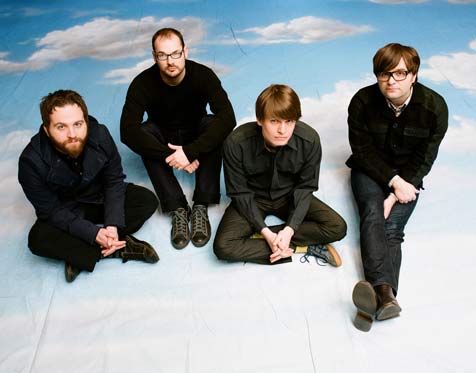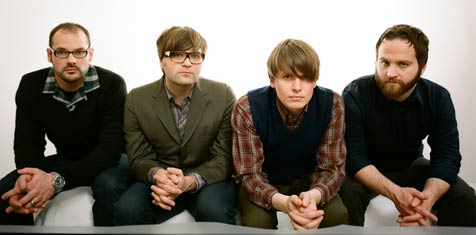Death Cab for Cutie’s Drummer Weighs In on Latest Album
Being the Heartbeat

It was fall 2002 and I was falling in love as a friend’s mixed CD brought Death Cab for Cutie’s “405” into my speakers. From that moment on, I was hooked. Next spring at Santa Cruz’s Catalyst, I stood with my elbows propped on the stage while Death Cab played songs from their as-yet-unreleased album Transatlanticism.
That record would go on to reach 97 on the Billboard 200 Album Chart and make Death Cab for Cutie, previously a band with mostly a cult following, practically a household name. It marked their last record with longtime label Barsuk, and brought about a new business arrangement with Atlantic Records. Cut to 2005’s major label debut, Plans, the most pop-heavy and polished album in the band’s catalogue. But Death Cab’s most recent effort, Narrow Stairs, is decidedly less radio-friendly and more brooding.
Transatlanticism was also the first album that included drummer Jason McGerr, who joined vocalist Ben Gibbard, guitarist Chris Walla, and bassist Nick Harmer in October 2002 to round out the Seattle-based foursome. McGerr recently phoned in from Montreal, and we spoke about uniforms, coffee, and Two Sticks.
What’s it like being the heartbeat of the band? Everyone looks back to you to make sure things are going okay. I get mouthed onstage: “Does this feel slow?” or “Is it too fast?” I think we all have a sort of muscle memory whenever we play, but maybe because I’ve got it in two hands and two feet I’m a little more conditioned to know whether things are where they’re supposed to be.
Is recording music with your own band a different experience than recording as a contributor? It is because you get to wear a different hat. My role in my band has been the same since I joined; they’re familiar with what I do. This is not meant to sound restrictive, but there’s a bit of a uniform I wear when I show up to play with Death Cab : When you show up and play with someone you’ve never played with before, it’s like a clean slate, so you can try something different.

Did you have that clean slate with Chris on his solo album, or did you go back to the uniform? [Laughs.] That was maybe just a jacket.
Has the band’s recording and creative process changed at all since you moved from Barsuk to Atlantic? Not a whole lot. The recording process changes every time we record; we tend to pick a different studio or scenario. Historically speaking, Chris has always produced and engineered the records so the group has always worked internally. Transatlanticism was the first time I think we went outside Seattle to record. For Plans, we booked a studio called Long View Farm [in Boston] and isolated ourselves. Narrow Stairs was the first time we brought in another engineer, Will Markwell, and he’s actually our front house engineer. We figured what better person to know and understand our sound and be able to call us out if we’re not playing very well. That allowed Chris to be more a part of the band and less the producer, even though he still was. There’s a whole different energy with all four people playing live in the room.
The other biggest change with this record is that we went back to using analog tape, so we don’t have the same sort of editing capabilities; you have to sign off on whatever performance you’re committing to tape, so there’s a much looser feel.
When recording Narrow Stairs, were you guys all playing at the same time? Eight or nine of the songs were all four of us playing at the same time. Half of those, Ben would come back and do vocals after the fact. But there were three or four that went down all live, like “I Will Possess Your Heart,” “Talking Bird,” and “Long Division.” “The Ice Is Getting Thinner” went down that way, but then all the music got stripped away, [we] kept the vocal, and Chris rewrote the music underneath to a far more brooding, desolate-sounding accompaniment. There was never any time when it was just me playing by myself, which is more of what happened on Plans. It was very much a surgical, individual performing process on Plans. But it’s dumb when you don’t play together. I mean, that’s the way they’ve made records for how many years? It’s really nice to get away from the option anxiety of the endless editing capabilities you can do with a computer and just go for it.
How was it recording at your studio, Two Sticks Audio? You’ve said you wanted to create a space where you guys could hang out and not get homesick. Did you accomplish this? [Laughs.] Yeah. I didn’t set out to build a studio to host five weeks of a Death Cab record; I just needed a place to host my drums more than anything. But if I was going to go that route, I was definitely going to go the extra mile. : I love the sound in the room that I built for drums. I’d be a jackass if I built a shitty sounding drum room being a drummer. [Laughs.]
Do you think you guys will record there in the future? Yeah, I know we will. : Right now it’s hosting other bands, so I feel a little bit cheated on.
You have writing credits on “I Will Possess Your Heart” and “Grapevine Fires.” What was your role in that? I think a writing credit, when it comes to a drummer, means you’ve contributed musically in some way; if you were to retract your contribution, the song would not exist. “Grapevine Fires” wasn’t really happening : and we decided that without that sort of signature shuffle drumbeat it wouldn’t be on the record. : There are other times when Ben demos a song and he’s dead-on with it and we honor the parts : and then sometimes a song ends up being totally torn apart and put back together.
When you joined the band, Death Cab was already successful, but now you walk into Starbucks or turn on the TV and hear one of your songs. What’s that like? It’s a little weird when you’re buying coffee and you realize you’re wearing the same sweater and glasses : I think we’re still all very grounded and casual. The fact that we’re on magazine covers and big posters outside theaters is just kind of like, “Oh, wow. Look at that. Weird.” [Laughs.] I mean, having a number one record doesn’t even register because none of us are trained to do anything other than put our blue collars up and go to work.
Narrow Stairs has gotten a lot of different responses. What’s your perception of the album? I think it’s the best record we’ve ever put out there as a band. Transatlanticism and Plans pretty much ran right into each other; I think there was a month or two off to take a short break : It’s like the last memory we had before setting forth on Narrow Stairs was that four years of touring. It wasn’t four years of being in a studio, it was four years of being a rock band, sweating it out onstage.
I think that if you’re a Death Cab fan or you have the catalogue, you can hear bits and pieces of Narrow Stairs throughout the years. Hopefully there’s a little bit of what’s to come in the future. I don’t feel like it’s that far of a cry from what we did, nor what we can do in the future.
4•1•1
Death Cab for Cutie plays with Rogue Wave at the Santa Barbara Bowl (1122 N. Milpas St.) on Tuesday, June 24. Visit www.sbbowl.com for more information.



